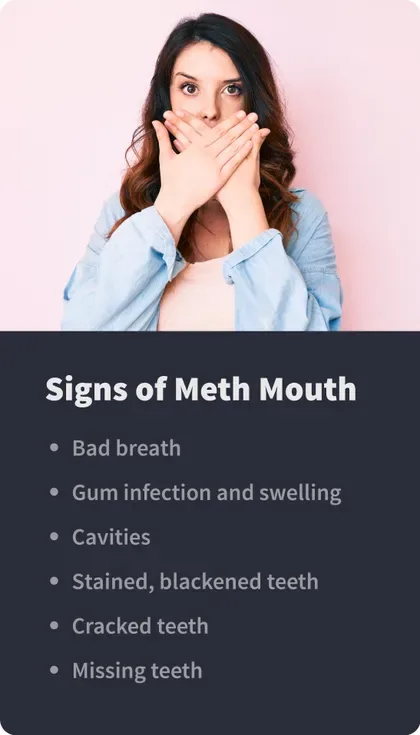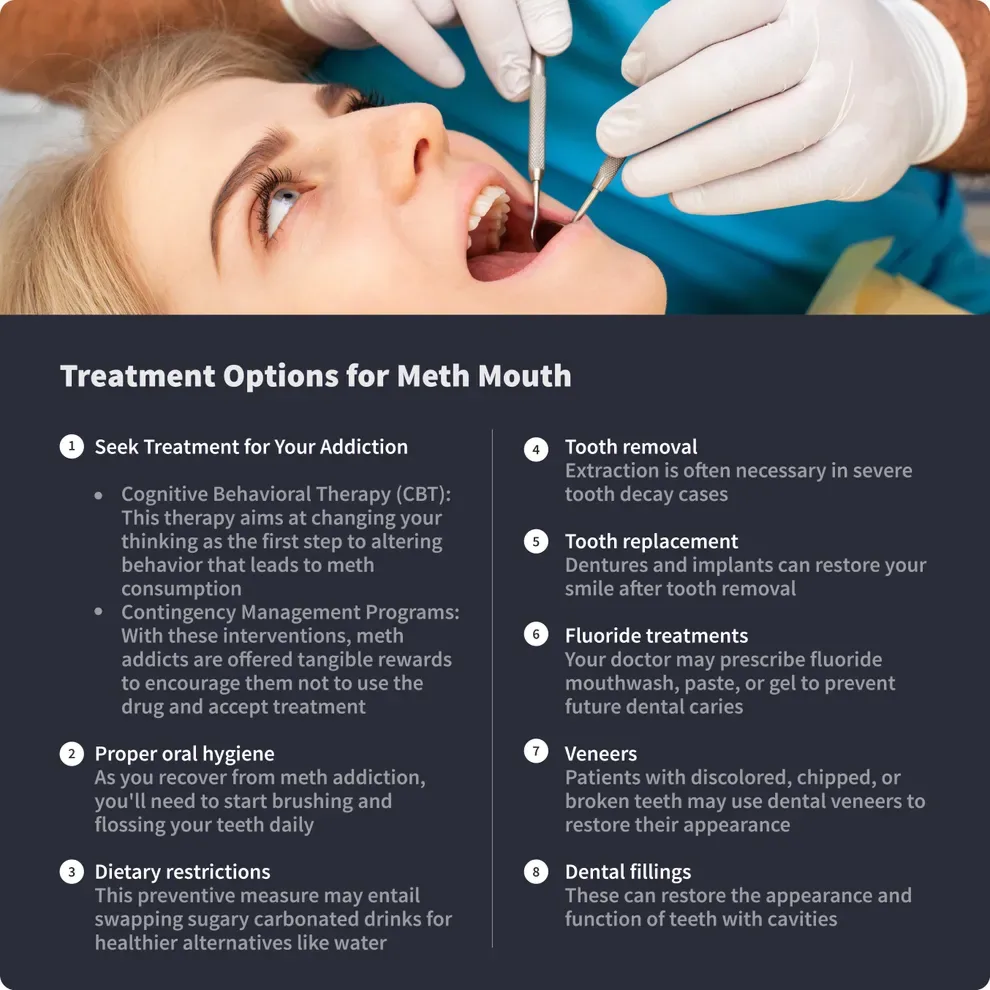What Is Meth Mouth & Is It Possible to Fix Your Teeth?

Table of Contents
- What is Meth Mouth?
- Why & How Meth Damages Teeth
- Oral Hygiene & Meth Mouth
- Are Drugs the Only Cause of Meth Mouth?
- Treatment Options for Meth Mouth
- Treatment Options for Meth Addiction
- Resources for Meth Addiction
- Resources for Cost Assistance
- References
Many people associate the use of methamphetamine, or meth, with severe health issues like stroke, heart problems, anxiety and sleep deprivation. Besides these common psychological and physical health effects, this highly addictive recreational drug can also cause irreversible dental complications, including meth mouth.
What is Meth Mouth?

The term meth mouth refers to the overall appearance of the teeth and gums of a methamphetamine user. Signs include:
Bad breath
Gum infection and swelling from uncontrolled bacterial growth in the addict’s mouth
Cavities
Stained, blackened teeth
Cracked teeth
Missing teeth
Meth addicts with this condition often experience severe dental issues, some of which are difficult to treat and others that are untreatable.
One study found that 96% of meth users have cavities, more than half have untreated decay in their teeth, and nearly one-third were missing six or more teeth.
Time-lapse photos of meth addicts can be dramatic in that they show the carnage the drug wreaks on a user’s smile and mouth.
Damage can be so extensive that the meth user experiences difficulty chewing or speaking. With the stained, cracked and falling-out teeth, the user also loses their natural, beautiful smile.
Why & How Does Meth Damage the Teeth?
Methamphetamine use can cause severe oral health problems, including meth mouth, in the following ways:
Acidic drug ingredients: Meth can be used with a number of dangerous, toxic, and highly acidic ingredients, including battery acid, fertilizers, and household cleaners. These toxins enter the body through meth use and can impact teeth.
Dry mouth: Meth can trigger xerostomia, causing an acute saliva deficiency in the mouth and creating ideal conditions for bacterial infection. Such infestation may impact the user’s teeth and gum health.
Passing out after use: Users may “crash” after a meth binge. Not only are they likely to pass out with a film of bacteria on their teeth if they haven’t brushed, but they are also more likely to breathe through their mouth and again trigger dry mouth.
Grinding teeth: Meth users often get into the habit of teeth clenching and grinding. This can result in severe wear on the teeth (enamel damage) and even jaw damage.
Drinking carbonated, sugary drinks: Meth users may crave highly sweetened drinks during their high.
Oral Hygiene & Meth Mouth
Research has shown that poor oral hygiene is one of the leading causes of severe meth mouth. Users often become so caught up in their addiction cycle that they lose touch with reality and are unable to keep up with day-to-day life and self-care, including dental hygiene.
Skipping brushing and flossing for prolonged times, especially when combined with bad habits like drinking sugary drinks and eating an unhealthy diet, can extensively damage oral health.
Are Drugs the Only Cause of Meth Mouth?
Recreational drugs aren’t the only cause of meth mouth triggers and effects. For example, multiple other factors can inhibit saliva production, causing dry mouth.
They include:
Prescription medication like pain relievers, antidepressants, and high blood pressure drugs
Aging
Cancer treatment, including chemotherapy and radiation
Health conditions like oral thrush, diabetes, and stroke
Tooth decay and gum disease have other causes too, including:
Not brushing and flossing teeth daily
Consuming sugary foods and beverages like sweets and carbonated drinks

How To Treat Meth Mouth
If you’re recovering from an addiction to meth, you may be eager to return to a normal, healthy life. A big part of this may be fixing any signs of “meth mouth” and regaining a great smile that will give you confidence as you move forward with your life.
Starting or restarting healthy dental habits can be an important part of your recovery process. Taking the time to perform a daily hygiene routine will not only help ensure that your dental problems don’t worsen, but also help reinforce positive daily habits and improve your oral health, which is linked to your overall health.
A good oral hygiene routine should include the following:
Brushing teeth twice a day (include the tongue in brushing)
Flossing once a day
Using an antimicrobial mouthwash
The first step in meth mouth treatment will be seeing a dentist for an initial cleaning and exam or checkup. This can be hard for many former addicts, as they may feel embarrassed about the current state of their oral health and teeth.
But it’s important to remember that your dentist is there to help you, not judge you. You should feel proud that you’re being proactive and taking the first step to improve your oral health and smile.
Your dentist may diagnose additional problems associated with meth mouth, including severe decay, gum disease, and missing teeth.
Treatment for these problems may include procedures such as these:
Deep cleaning: This is also called scaling and root planing. During a deep cleaning, the dentist uses tools to manually remove plaque and tartar buildup and clean teeth roots. Deep cleaning may be necessary for cases of gum disease.
Tooth removal: Extraction may be necessary in cases of severe decay.
Fillings: Cavities may be present after an extended period of meth addiction.
Fluoride treatment: Your doctor may prescribe fluoride mouthwash, paste, or gel to prevent future dental decay and cavities.
Tooth replacements: Bridges, dentures, and implants may be needed to treat a lost tooth.
Meth mouth can cause orthodontic problems, as the associated decay can lead to missing teeth. This can cause teeth to shift into misalignment. Meth users may also have caused damage to their teeth or jaw by clenching or grinding their teeth.
Even those who don’t have orthodontic issues due to meth mouth but have never felt confident about their less-than-straight smile may also seek to correct smile and bite problems during recovery. A great smile can help you feel confident in your new path in life.
The most popular orthodontic treatments are braces and clear aligners.
Braces are attached to teeth and require in-office procedures and checkups. Traditional metal braces are the most affordable option and may be required for complex or severe orthodontic problems.
Ceramic braces are slightly more expensive than metal braces, but they use clear or tooth-colored hardware to blend into teeth more. Lingual braces, which are invisible as the hardware is attached to the back of teeth, are the most expensive option, and they are usually not covered by insurance.
Average treatment time: 1–3 years
Average cost: $3,000–$6,000 for metal braces; $4,000–$7,000 for ceramic braces; $6,000–$10,000 for lingual braces
Clear aligners are removable, and they fit over teeth. During aligner treatment, you progress through a series of aligners that gradually move your teeth into an ideal position.Some aligners are provided by orthodontists and require in-office visits.
Other alignment providers offer completely remote treatment that starts with an at-home impression kit. Check-ins are done virtually, and treatment is monitored remotely by an orthodontist.
Average treatment time: 6 months
Average cost: $3,500–$7,500 for in-office aligners; $900–$2,500 for at-home or mail-order aligners
Enhancing your smile with cosmetic procedures and products can often offer fast and rewarding results. Popular options include the following:
Veneers: Tooth “covers” that are customized to fit over your teeth and give a tooth a completely new look. Veneers cost approximately $500 to $1,300 per tooth.
Bonding: A tooth-colored resin is shaped and applied to a tooth in order to repair it. Bonding costs approximately $100 to $400 per tooth.
In-office whitening: Your dentist applies a powerful bleaching product to teeth for maximum whitening results. This costs approximately $500.
At-home whitening products: There are many at-home teeth whitening and brightening products available, including toothpastes, kits, mouthwashes, and night strips. Strength, effectiveness, and price vary greatly, so it’s important to read reviews and ingredients carefully. These cost about $5 to $50 per product.
Treatment Options for Meth Addiction
Treating meth mouth can help your daily oral hygiene and prevent any dental problems from getting worse. But to truly address the issue, you must treat the root of the problem: meth addiction.
If you’re struggling with meth addiction, there are treatment options available to help you regain control of your life and health.
To start recovery treatment, you must get through the difficult “detox” phase of quitting methamphetamine. This highly addictive drug can cause serious physical and mental effects during withdrawal, including these:
Fatigue
Mood swings
Strong meth cravings
Insomnia
Depression
Many people opt for professional care in a treatment center during their withdrawal.
During withdrawal and detox, your doctor may prescribe medications to help with the side effects and to make you more comfortable. Medications such as antidepressants may be prescribed during recovery.
Behavioral therapy aims to help patients change their behavior. By changing the way you think or perceive things, you may be able to change how you react to issues. As a result, you can form new and healthier habits. Behavioral therapy can provide you with the tools to avoid self-destructive behavior and handle stress, trauma, and day-to-day life more successfully.
Resources for Meth Addiction
SAMHSA (Substance Abuse and Mental Health Services Administration) Confidential Hotline (available 24 hours a day, 365 days a year): 1-800-662-HELP
SAMHSA (Substance Abuse and Mental Health Services Administration): Get Help
National Institute on Drug Abuse: Treatment Approaches for Drug Addiction DrugFacts
Resources for Cost Assistance for Dental Work When Sober
Some areas have dental resources available to recovering addicts, including community clinics, community advocacy groups, and nonprofit initiatives.
Most dental insurance policies will cover some or all of the costs of treatment for the dental problems associated with meth mouth.
The United Way may have a local office that could help with information on dental resources. Find a location near you.
